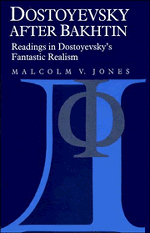Book contents
- Frontmatter
- Contents
- Preface
- 1 Introduction: Dostoyevsky's fantastic realism
- Part One The Underground
- Part Two Driving People Crazy
- 4 Crime and Punishment: driving other people crazy
- 5 The Devils: driving society crazy
- 6 The Idiot: driving the reader crazy
- Part Three Chinese Whispers
- Notes
- Bibliography
- Index
5 - The Devils: driving society crazy
Published online by Cambridge University Press: 21 August 2009
- Frontmatter
- Contents
- Preface
- 1 Introduction: Dostoyevsky's fantastic realism
- Part One The Underground
- Part Two Driving People Crazy
- 4 Crime and Punishment: driving other people crazy
- 5 The Devils: driving society crazy
- 6 The Idiot: driving the reader crazy
- Part Three Chinese Whispers
- Notes
- Bibliography
- Index
Summary
For tactical reasons I propose skipping Dostoyevsky's next major novel and making my points in relation to The Idiot and The Devils in reverse order. This is because my discussion of the way in which characters in Crime and Punishment drive each other crazy naturally raises the wider social implications of such strategies. Such questions, are, I think, best dealt with in relation to The Devils whose social range is greater than that of Dostoyevsky's other novels and where hierarchy, expressed in terms of religion, society, literary forms or even bodily functions, is exemplified in its most acute form and most obviously threatened with collapse.
It is Pyotr Verkhovensky's avowed aim to bring about this collapse, to undermine the foundations of morality and the state, to bring everything down with a crash by political action.
CARNIVAL AND SCANDAL: SOME THEORETICAL CONSIDERATIONS
There is no doubt that the novel in general and particularly the chapters on the ‘holiday’ (prazdnik or fête) invite analysis in terms of Bakhtin's concept of carnival. It is not, however, that the prazdnik is an example of carnival pure and simple. Bakhtin says in his book on Rabelais,
As opposed to the official feast, one might say that carnival celebrated temporary liberation from the prevailing truth and from the established order; it marked the suspension of all hierarchical rank, privileges, norms, and prohibitions.
- Type
- Chapter
- Information
- Dostoyevsky after BakhtinReadings in Dostoyevsky's Fantastic Realism, pp. 96 - 112Publisher: Cambridge University PressPrint publication year: 1990



